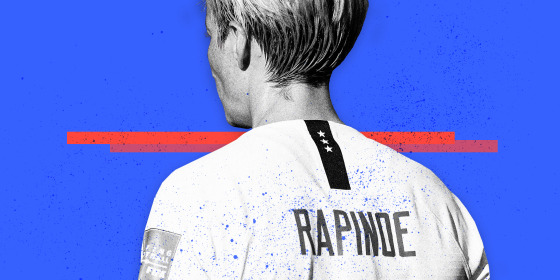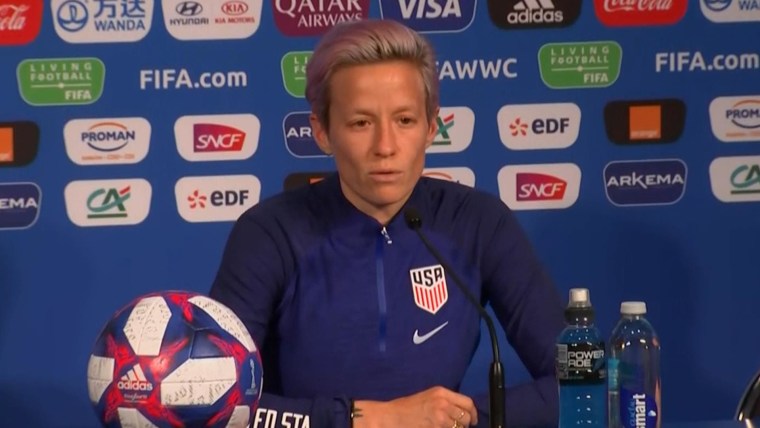PARIS — Megan Rapinoe scored both goals against Spain on Monday to advance the United States to the quarterfinal round of the Women’s World Cup, where they faced the hosts and favorites France on Friday. Rapinoe scored two goals against France, too, helping the U.S. advance to the semifinals against England on July 2. But despite her prowess on the field, the American midfielder was the target of a rant from tweeter-in-chief Donald Trump last week.
"Megan should never disrespect our Country, the White House, or our Flag, especially since so much has been done for her & the team,” Trump tweeted on June 26. "Be proud of the Flag that you wear."
Trump was reacting to a new viral video in which Rapinoe, asked months ago whether she would visit the White House if invited by the president, responded casually: “Pfft. I’m not going to the f------ White House.” Rapinoe isn’t alone either — teammates Alex Morgan, Ali Krieger and Becky Sauerbrunn have all shared similar sentiments publicly.
Apparently to Trump, this means that Rapinoe and her highly decorated teammates don’t respect their country and aren’t patriotic enough. Trump, who in the same tweet claimed to be “a big fan” of women’s soccer, clearly doesn’t know much about Megan Rapinoe or the U.S. women’s national team.
After all, for years Rapinoe and her colleagues have been doing the most patriotic things athletes can do: Not only have they’ve been winning World Cups and Olympic gold medals for the United States, they’ve managed it all while fighting for equality — in sports and society at large.
When Rapinoe first joined the national team in 2006, the U.S. women were already fighting for the rights of female athletes. They were demanding a living wage so they don’t need second jobs, a calendar of regular games to stay sharp and protections so if players get injured (or pregnant) their careers wouldn’t be stuck in limbo — benefits their male counterparts already enjoyed. Their efforts have served as inspiration to women’s national teams around the world, who have followed the USA’s lead.
Trump, who in the same tweet claimed to be “a big fan” of women’s soccer, clearly doesn’t know much about Megan Rapinoe or the U.S. women’s national team.
Earlier this year, the American players sued their boss, the U.S. Soccer Federation, alleging longtime institutionalized gender discrimination. The headline-grabbing part of the lawsuit was about equal pay, but the complaint makes a larger and more compelling point about female athletes being treated as an afterthought.
Rapinoe, who is openly gay, has been perhaps the most outspoken of her teammates.
She was the first white athlete to join in NFL quarterback Colin Kaepernick’s ongoing protest over police brutality and other racial inequalities by kneeling during the national anthem in 2016. That was the moment that Rapinoe — an affable, gregarious and witty fan-favorite — managed to become a lightning rod. The player who once memorably celebrated a World Cup goal by running over to a field microphone and belting out “Born in the U.S.A.” by Bruce Springsteen was suddenly being called un-American.
The U.S. Soccer Federation swiftly passed a new bylaw requiring players to stand for the national anthem, forcing Rapinoe to back off her protest. But Rapinoe says she has no regrets over the ordeal.
"I feel like I'm a walking protest,” she once explained.
Some critics are quick to declare that Rapinoe and her teammates ought to “stick to sports.” But sports are inherently political, and indeed history is filled with expressions of protest from athletes. From deliberate ones, like Tommie Smith and John Carlos’ iconic Black Power salute during the 1968 Olympics, to passive ones like gold medalist Jesse Owens serving as the foil to Hitler’s vision of white supremacy at the 1936 Olympics in Berlin.
For Rapinoe and the U.S. women’s national team, their form of protest is both.
While Rapinoe doesn’t flinch at calling out the mistreatment of female athletes and the unfair burdens of intersectionality — and she has labeled Trump “sexist,” “misogynistic,” “small-minded,” “racist” and “not a good person” — even her more reserved teammates manage to make their own statements on the soccer field.
“I think our existence in professional sports is almost a protest in and of itself in the very sexist society that we live in,” Rapinoe once said.
There’s an argument to be made that protest in the name of progress — in the name of looking forward — is the most patriotic thing an athlete can do. Despite Trump’s doubts about Rapinoe’s respect for her country, her actions obviously stem from a belief that she is advocating for something bigger than herself. And she is sending a clear message to the youth of America, girls and boys, about what it looks like when athletes use their platform to advocate for others.
There’s an argument to be made that protest in the name of progress — in the name of looking forward — is the most patriotic thing an athlete can do.
Rapinoe has admitted she has never suffered the racial injustices that Kaepernick and other people of color have, but she still kneeled and suffered the backlash anyway. Rapinoe has admitted she will never see the benefits of the gains she helped fight for in the women team’s new collective bargaining agreement, but she dug her heels in anyway.
Indeed, Rapinoe and the women’s national team are exactly the type of athletes — exactly the type of people — who should be welcomed into the White House. But not out of spite or as part of some manufactured culture war from Trump, whose presidency has been built on such divisive stunts. Rapinoe and the women of the women’s national team couldn’t be better examples of patriots, whether or not they beat France in Friday’s quarterfinal and continue their campaign to defend their World Cup title.

